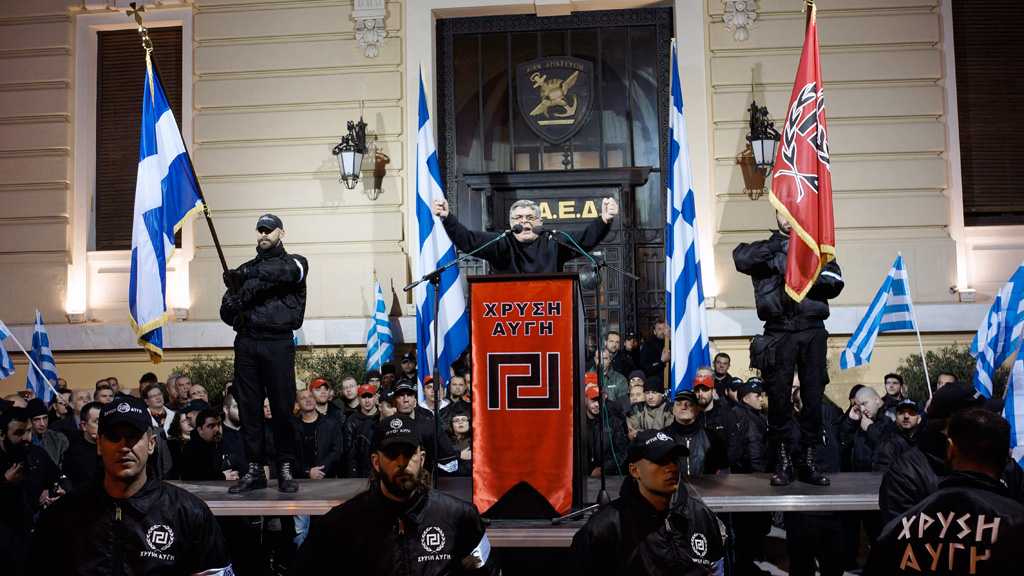On Aug. 2, a group of unidentified men savagely attacked a Pakistani immigrant in Athens, leaving him hospitalized with a broken jaw and multiple bruises. Five days later, Ashkan Najafi, a native of Iran, was severely beaten and stabbed 12 times in Piraeus, a port city south of Athens. He required at least 60 stitches.
These are but two reports of the criminal xenophobia bubbling across Greece. While the anti-Semitic, ultra-right-wing members of and sympathizers with the neo-Nazi Golden Dawn party are largely responsible for the violence, Greece’s political leaders, law enforcement and judicial system have clearly failed to stem the tide.
Greece is not the only European Union member facing a surge of ultra-right-wing, anti-immigrant groups. However, its deep economic slump, dire poverty, massive unemployment fostered by austerity policies and lack of comprehensive immigration laws have turned Greece into an advanced laboratory for institutionalized racism in Europe.
State complacence
Over the last few years, nongovernmental organizations have attempted to raise awareness of the racist attacks perpetrated by members of and sympathizers with Golden Dawn across Greece. Confronting resistance from authorities over the extent of the problem, investigations led by Human Rights Watch, Doctors of the World and the Greek Council for Refugees found sustained attacks against immigrants and refugees. Similarly, the Racist Violence Recording Network, a project by the Office of the U.N. High Commissioner for Refugees in Greece, documented 151 hate crimes against refugees and migrants in 2012 and 143 similar incidents in 2013.
The slight decline in indiscriminate violence has been attributed to the prosecution of Golden Dawn leaders, including the jailing in September 2013 of its general secretary, Nikolaos Michaloliakos. But these show trials present a misleading image of a Greece that is successfully combating xenophobia. In the last European elections, Golden Dawn gained nearly 9.4 percent of the vote. Other evidence reveals that ultra-right ideologies have penetrated state institutions.
The police appear to be at the forefront of state-sponsored racism in Greece. Migrants and refugees I interviewed in Athens this summer complained of arbitrary stops, intrusive searches and racial slurs by police officers. In 2012 the Greek police initiated Operation Xenios Zeus, designed to track immigrants residing unlawfully in Athens. It led to the arrest of some 85,000 foreigners, of whom only 6 percent were undocumented. The European Union Agency for Fundamental Rights questioned the constitutionality of Xenios Zeus, stressing that the police were engaged in “illegal activity” on behalf of Golden Dawn. Despite this warning, Greek police launched a similar operation in July, Operation Theseus, mainly aimed at curbing illegal immigration.
The judiciary has also failed to tackle xenophobia. Worryingly, some judges appear to be aiding ultra-right causes. In the past few weeks, a naval court in Piraeus closed an investigation into the responsibility of the coast guard for Afghan refugees who were drowned during an illegal pushback attempt in January. Similarly, a court in Patras acquitted farmers who had shot Bangladeshi workers after they demanded six months of unpaid wages. Many human rights organizations, including the Greek Council for Refugees has criticized the multiple procedural flaws that led to these two alarming judicial failures.
Racial discrimination appears to have been tolerated by the newly elected Greek parliament and Prime Minister Antonis Samaras’ government, according to a new report by the nonprofit group Human Rights First. After months of fierce opposition, an anti-racism law was finally passed on Sept. 9 in order to adapt Greek legislation to international standards. The bill tightens criminal sanctions for hatred, discrimination and violence but has glaring holes in enforcement.
“The bill does not include measures to encourage reporting of violent hate crimes or to ensure appropriate action by the police and judiciary to counter hate violence,” Human Rights Watch said in a statement.
 Seems like you are now set to make this thread about Greece, good for you, gone fishing)
Seems like you are now set to make this thread about Greece, good for you, gone fishing) Seems like you are now set to make this thread about Greece, good for you, gone fishing)
Seems like you are now set to make this thread about Greece, good for you, gone fishing)





 Your source is Wiki and you expect completeness. Even wiki refers to a whip cracking.
Your source is Wiki and you expect completeness. Even wiki refers to a whip cracking. 